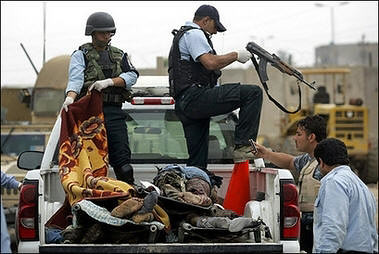
Iraqi policemen gather bodies in the back of their pickup truck in the aftermath of a suicide truck bomb that exploded inside their compound in the predominantly Sunni al-Dora neighborhood of southern Baghdad. Suicide attacks waged by a lorry driver posing as a goods merchant and a bomber in a sweet shop killed dozens of Iraqis on Saturday, underscoring the vicious nature of a changing insurgency.
(AFP/David Furst)
Monkeys
by Matthew Rohrer and Joshua Beckman
In another jungle the monkeys fret.
Vibrations are tremendous.
Terror begins.
Mist dissipates.
Monkeys alight in unison
while beneath them nothing sexy happens.
From within one mangrove a monkey flutters helplessly,
another watches.
Noise like refined alabaster drifts across our monkeys.
Human intellect dwarfs only that first tear.
Everything else excels.
Intellect is nothing to savor.
Monkeys know.
Monkeys see.
Monkeys do.
As monkeys follow nauseated foresters
across wet walkways they announce their intentions.
Mankind savors variety.
Monkeys savor mankind.
Poachers came and grabbed the monkeys.
In disturbing circumstances they thrive.
Our satellites saw lilacs.
Nighttime.
No one wanders forever.
- - -
Most of the people Othman and Laith knew had left Iraq. House by house, Baghdad was being abandoned. Othman was considering his options: move his parents from their house (in an insurgent stronghold) to his sister’s house (in the midst of civil war); move his parents and brothers to Syria (where there was no work) and live with his friend in Jordan (going crazy with boredom while watching his savings dwindle); go to London and ask for asylum (and probably be sent back); stay in Baghdad for six more months until he could begin a scholarship that he’d won, to study journalism in America (or get killed waiting). Beneath his calm good humor, Othman was paralyzed—he didn’t want to leave Baghdad and his family, but staying had become impossible. Every day, he changed his mind.
From the hotel window, Othman could see the palace domes of the Green Zone directly across the Tigris River. “It’s sad,” he told me. “With all the hopes that we had, and all the dreams, I was totally against the word ‘invasion.’ Wherever I go, I was defending the Americans and strongly saying, ‘America was here to make a change.’ Now I have my doubts.”
Laith was more blunt: “Sometimes, I feel like we’re standing in line for a ticket, waiting to die.”
from Betrayed - The Iraqis who trusted America the most.
by George Packer
The New Yorker
March 26, 2007
- - -

6 comments:
I witness.
for peace
I witness
for peace
i witness for peace
peace peace peace
peace.
Post a Comment